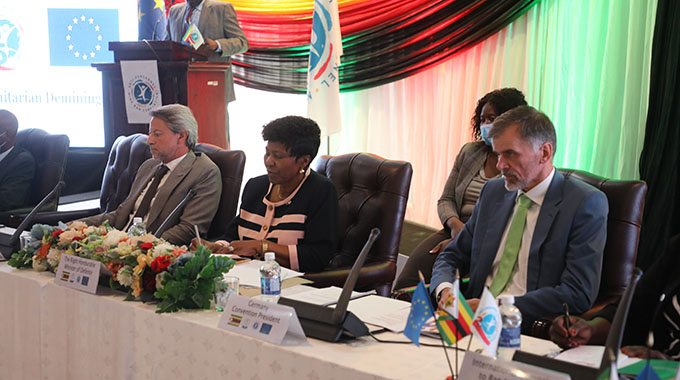Free landmine society by 2025: Minister

Columbus Mabika Herald Reporter
Zimbabwe remains committed to a landmine-free society by 2025 and to spearheading development in the once affected areas, Defence and War Veterans Affairs Minister Oppah Muchinguri-Kashiri has said.
Speaking during a stakeholders dialogue on humanitarian demining for a mine-free Zimbabwe in Harare yesterday, Minister Muchinguri said landmine clearance remained a priority for the development of Zimbabwe as the nation geared towards attaining an upper middle income status by the year 2030.
During the liberation war vast fields of anti-personnel mines were laid along the border by the settler regime.
Any remaining road mines, and these are easy to detect and lift, at independence were lifted long ago, but the millions of the tiny anti-personnel mines, which are difficult to detect and still deadly, are in some areas despite the considerable progress made since independence.
“Our focus on clearing the remaining landmines by December 2025 remains realistic, and buttressed by the results of the Mine Action Monitor, which ranked the Zimbabwean Programme the best in 2021.
“We owe this success to high level of commitment and cooperation between ourselves and our cooperating partners.
“However, dwindling resources have been identified as the elephant in the room that militated against our ability to achieve our target in the past,” she said.
During the dialogue, a number of regional and global humanitarian organisations involved in landmines pledged to work with Zimbabwe in a bid to achieve a landmine free country in two years’ time.
African Union (AU), director Governance and Conflict Prevention Political Affairs, Peace and Security Department, Ms Patience Zanelie Chiradza said the AU remains committed to supporting countries in the continent that are still challenged by contamination by landmines.
“Anti-personnel landmines are one category of weapons that are internationally banned under the 1997 Mine Ban Convention, to which Zimbabwe is party. Zimbabwe has, over the years remained committed to meeting its obligations under the Treaty, and is now working towards clearing all contaminated areas by 2025, in line with Article 5 of the Convention,” she said.
“The African Union remains resolute in supporting the ban against this indiscriminate weapon since 1997 when the Organisation of African Unity (OAU) held the First Continental Conference of African Experts on Landmines.
“The Continental Policy Organs have since continued to call on the African Union Commission to spare no efforts in mobilising support for the affected Member States in order to achieve a mine-free Africa.”
She said Zimbabwe has developed a world-class strategy that the AU is proud of, to achieve landmine clearance target.
“I want to applaud Zimbabwe for the strong sense of ownership it continues to demonstrate for its mine action agenda. However, there is need to consolidate, strengthen and intensify resource mobilisation efforts, both at national level and with international partners, for Zimbabwe to be able to achieve the 2025 deadline.”
Ambassador of the European Union to the Republic of Zimbabwe, Mr Jobst von Kirchmann said landmines reveal a bad legacy of war which has hindered development.
“Landmines are a cruel weapon, made even crueller by varieties that come in odd shapes and colours, making them irresistible to children. A deadly legacy of war, they can remain for decades in the ground, long after the fighting stops, cutting off communities and making it impossible for them to rebuild or move on,” he said.
“Over 40 years on from independence, these unfenced minefields have killed or injured over 1,600 people and more than 120,000 cattle. The human cost is huge, but loss of cattle threatens livelihoods too.”
German Ambassador to Zimbabwe Udo Volz said efforts by Zimbabwe to address the landmine threat has been very welcome and the progress made to date is very commendable.
Anti-Personnel Mine Ban Convention Implementation Support Unit Project and Communication Manager Laila Rodriguez-Bloch said stakeholders were willing to help Zimbabwe fight landmines.
“The Convention on the Prohibition of Anti-Personnel Mines hosts a meeting with international and national stakeholders, to support Zimbabwe to finish clearing contaminated lands with anti-personnel mines,” she said.
Staring defeat by the liberation war fighters, Rhodesian leader Ian Smith’s regime laid these large minefields of anti-personnel mines along the borders in an unsuccessful effort to prevent the liberation forces from entering Zimbabwe and preventing recruits from going across borders to join the war.
The Zimbabwe Defence Forces and its demining partners have cleared more than 291 square kilometres of landmines, leaving 19,4 square kilometres still to be cleared since the inception of demining operations.
The clearance has been difficult as the anti-personnel mines tend to be small, and shift easily when it rains, and the triggers of other anti-personnel weapons like the claymore mines can rot and decay.
The minefields were never properly mapped by the Smith regime and so have to be cleared very carefully, one mine at a time.
Zimbabwe is among countries with the highest density of landmines in the world, statistics provided by an international organisation have shown.
Worldwide, 23 people a day are killed or injured by landmines or unexploded bombs.








Comments